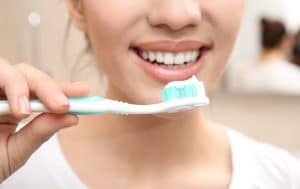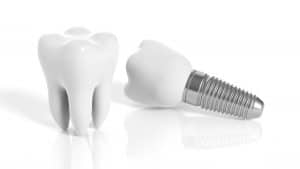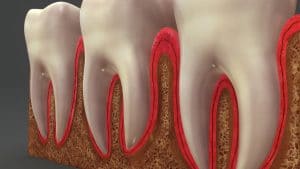 Everyone’s risks for developing gum disease are different depending on a wide variety of factors. For instance, some patients may have certain medical conditions or genetic predispositions that might make them more susceptible to the disease. However, for most patients in Encinitas/San Diego, the risks of gum disease can be largely mitigated (or eliminated) with just a few conscientious choices about their dental hygiene and daily routines. With a stronger focus on keeping their smiles healthy, most patients have a good chance at avoiding gum disease altogether. (more…)
Everyone’s risks for developing gum disease are different depending on a wide variety of factors. For instance, some patients may have certain medical conditions or genetic predispositions that might make them more susceptible to the disease. However, for most patients in Encinitas/San Diego, the risks of gum disease can be largely mitigated (or eliminated) with just a few conscientious choices about their dental hygiene and daily routines. With a stronger focus on keeping their smiles healthy, most patients have a good chance at avoiding gum disease altogether. (more…)
A Few Good Ways to Prevent Adult Tooth Loss
 These days, patients in Encinitas/San Diego have several options for rebuilding and preserving their smiles after suffering from adult tooth loss. However, there are also several options for improving their oral health and preventing tooth loss from occurring in the first place. For example, if you successfully prevent severe periodontal disease, which is the leading cause of adult tooth loss, then you have a greater chance of preserving all of your healthy, natural teeth for life. (more…)
These days, patients in Encinitas/San Diego have several options for rebuilding and preserving their smiles after suffering from adult tooth loss. However, there are also several options for improving their oral health and preventing tooth loss from occurring in the first place. For example, if you successfully prevent severe periodontal disease, which is the leading cause of adult tooth loss, then you have a greater chance of preserving all of your healthy, natural teeth for life. (more…)
Your Periodontist’s Tips for Better Hygiene
 The fact that good hygiene is the cornerstone of good dental health is no secret. However, sticking to every tenet of good hygiene on a consistent basis can sometimes prove more than most people can manage. Because of this, many patients in Encinitas/San Diego experience conditions such as periodontal disease that are typically highly preventable. Therefore, to help you better preserve your smile, we offer a few tips on how to make your hygiene routine as effective as possible every day. (more…)
The fact that good hygiene is the cornerstone of good dental health is no secret. However, sticking to every tenet of good hygiene on a consistent basis can sometimes prove more than most people can manage. Because of this, many patients in Encinitas/San Diego experience conditions such as periodontal disease that are typically highly preventable. Therefore, to help you better preserve your smile, we offer a few tips on how to make your hygiene routine as effective as possible every day. (more…)
The Two Methods of Successfully Treating Gum Disease
 Periodontal disease, which is more commonly known as gum disease, is one of the more complex chronic oral health issues. That’s because the level of damage that it causes depends on the specific stage of disease, and treatment can range from a relatively simple deep cleaning to more involved, ongoing periodontal maintenance. For patients in Encinitas/San Diego, successfully treating gum disease typically involves two important aspects – dealing with the harmful oral bacteria that cause it and repairing any damage to your gums that may have occurred. (more…)
Periodontal disease, which is more commonly known as gum disease, is one of the more complex chronic oral health issues. That’s because the level of damage that it causes depends on the specific stage of disease, and treatment can range from a relatively simple deep cleaning to more involved, ongoing periodontal maintenance. For patients in Encinitas/San Diego, successfully treating gum disease typically involves two important aspects – dealing with the harmful oral bacteria that cause it and repairing any damage to your gums that may have occurred. (more…)
How Do We Treat Periodontal Disease With Laser Dentistry?
 When we see an Encinitas/San Diego, CA, patient with a more advanced case of gum disease, we often offer treatment using advanced technology. For example, the laser-assisted new attachment procedure (LANAP) uses laser technology to combat gum disease and improve oral health. Do you have questions about our laser periodontal treatment?
When we see an Encinitas/San Diego, CA, patient with a more advanced case of gum disease, we often offer treatment using advanced technology. For example, the laser-assisted new attachment procedure (LANAP) uses laser technology to combat gum disease and improve oral health. Do you have questions about our laser periodontal treatment?
What Does Placing Dental Implants Involve?

When we see patients with missing teeth, we provide a dependable, long-lasting, and lifelike solution: dental implants. But how do we place them? What makes them so different from traditional bridges or dentures? Find out how we address tooth loss for our Encinitas/San Diego, CA, patients.
Community Events In Encinitas, CA

We’re proud to serve the communities of Encinitas and San Diego, CA with quality periodontal care and implant dentistry. In today’s blog, we’re going to take a little break from our usual topics and talk about the community. Throughout October, there will be a ton of fun events taking place in Encinitas, CA. If you would like to enjoy these activities with a healthier smile, we’re ready to help!
Quiz: How Do You Treat Gum Disease?
 When a patient develops periodontal disease, they begin to experience uncomfortable symptoms, such as sore, red, swollen, or bleeding gums. In order to restore the health of your smile and avoid complications, such as adult tooth loss, you will need gum disease treatment. Let’s look at the treatment options we offer our Encinitas/San Diego, CA, patients.
When a patient develops periodontal disease, they begin to experience uncomfortable symptoms, such as sore, red, swollen, or bleeding gums. In order to restore the health of your smile and avoid complications, such as adult tooth loss, you will need gum disease treatment. Let’s look at the treatment options we offer our Encinitas/San Diego, CA, patients.
What Is A Scaling And Root Planing?

When patients in Encinitas and San Diego, CA, experience the symptoms of gum disease, we often address the early stages with a preventive deep cleaning. Also known as a scaling and root planing, how does this procedure combat gum disease? We’re answering questions about our deep cleanings in today’s blog.
What Are The Warning Signs Of Gum Disease?
 According to studies conducted by the Centers for Disease Control, half of adults over the age of 30 suffer from some stage of periodontal disease. Despite the widespread prevalence of periodontal disease, there are warning signs patients in Encinitas and San Diego, CA, can watch for, and steps that can be take to helps safeguard gum health and prevent the disease.
According to studies conducted by the Centers for Disease Control, half of adults over the age of 30 suffer from some stage of periodontal disease. Despite the widespread prevalence of periodontal disease, there are warning signs patients in Encinitas and San Diego, CA, can watch for, and steps that can be take to helps safeguard gum health and prevent the disease.



